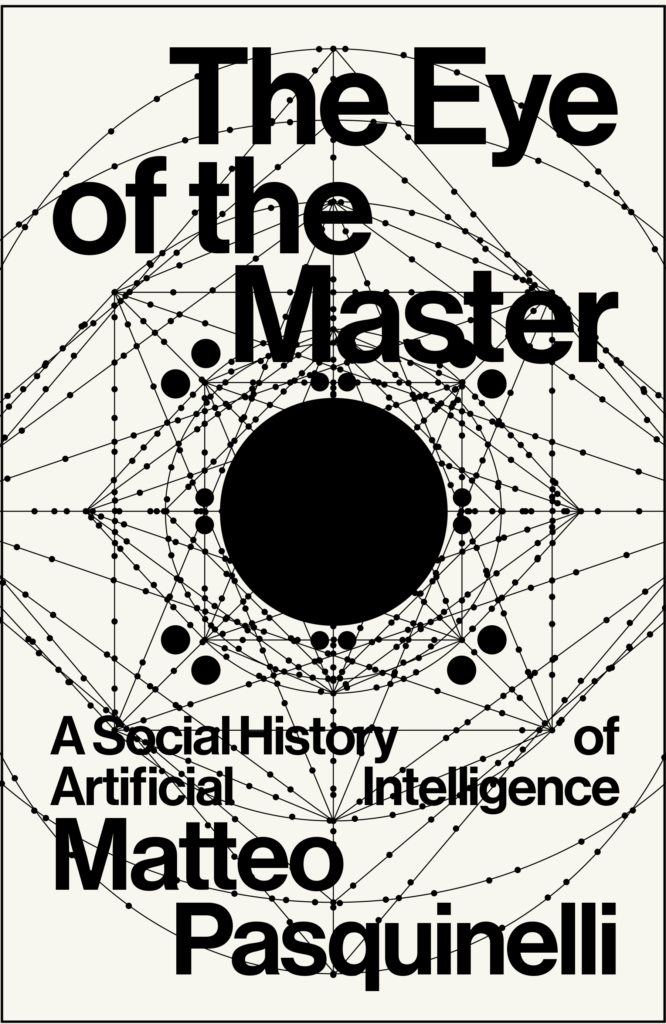Reading Group #2: Hidden Labour
Wednesday 17 June 2020, 15:00–17:00 BST
Co-facilitator: Prof. Matteo Pasquinelli (University of Arts and Design Karlsruhe)
Discussants: Audrey Borowski (University of Oxford), Cindy Lin (University of Michigan, Ann Arbor)
Moderator: Prof. Matthew L. Jones (Columbia University)
Readings:
- Daston, Lorraine (2018). ‘Calculation and the Division of Labor, 1750-1950’. Bulletin of the German Historical Institute, 62 (Spring), 9-30.
- Pasquinelli, Matteo (forthcoming). ‘The Material Tools of Algorithmic Thinking’, chapter 1. The Eye of the Master. London: Verso.
Matteo Pasquinelli is professor at the University of Arts and Design Karlsruhe. Prof. Pasquinelli coordinates the research group on media philosophy and artificial intelligence KIM. With Vladan Joler, he recently published the visual essay ‘The Nooscope Manifested: AI as Instrument of Knowledge Extractivism’. For Verso, he is preparing a book titled The Eye of the Master on the history of AI as the automation of labour, of its vision and division.
A summary of the Hidden Labour theme is available here. Prof. Pasquinelli provides the following overview of the session:
The Hidden Intelligence of Labour: For a Social History of Algorithms
Different genealogies of artificial intelligence can be read on the shoulders of workers, merchants, bureaucrats and spies. AI emerged as the project to automate tasks that, since WWII, have ranged from image recognition and object manipulation, to stock price negotiation, and the analysis of public and military datasets.
This overview retraces a canonical genealogy of AI from within the milieu of the industrial revolution and early political economy. Daston (1994, 2017), Schaffer (1994), and Jones (2016) have shown that the project of machine intelligence emerged from the industrial automation of mental labour as hand calculation (Babbage, 1832) rather than the mere dream to forge ‘thinking automata.’ The design of intelligent algorithms imitated, then, the ‘analytical intelligence’ (Daston, 2018) of the division of labour. This intuition can be expanded, today, to interrogate in which way the algorithms of machine learning automate sophisticated forms of manual, mental and visual labour by encoding an extended division of space, time and social behaviours.
In order to understand the relation between AI and labour, it would be useful to clarify first the relation between the algorithm form and the division of labour. From the point of view of invention and knowledge production, which one comes first? Knuth (1972) attempted a historicisation of the algorithm in the essay ‘Ancient Babylonian Algorithms.’ At the time, Knuth aimed at systematising the new field of computer science and to make it into a respectable academic and industrial discipline (Ensmerger, 2010). The idea of the ancient algorithm was mobilised to stress that the new field of computer science was not about obscure machinery but part of a long tradition of cultural techniques of symbolic manipulation. On their side, historians of mathematics such as Chabert (1999), Damerow and Lefèvre (1981) have clarified the genesis of mathematical abstractions in the relation of labour with material tools. Also these approaches can be used to interrogate computation and AI as a solution to the problem of the management of labour, or, from another angle, to recognize the hidden intelligence of labour building the algorithm from within.
References
- Babbage, Charles (1832). On the Economy of Machinery and Manufactures. London: Charles Knight.
- Chabert, Jean-Luc, ed. (1999). A History of Algorithms: From the Pebble to the Microchip. Berlin/New York: Springer.
- Damerow, Peter, and Wolfgang Lefèvre, eds. (1981). Rechenstein, Experiment, Sprache: Historische Fallstudien Zur Entstehung Der Exakten Wissenschaften. Stuttgart: Klett-Cotta.
- Daston, Lorraine (1994). ‘Enlightenment Calculations’. Critical Inquiry 21, no. 1: 182-202.
- Daston, Lorraine (2018). ‘Calculation and the Division of Labor, 1750-1950’. Bulletin of the German Historical Institute, 62 (Spring), 9-30.
- Ensmenger, Nathan (2010). The Computer Boys Take Over: Computers, Programmers, and the Politics of Technical Expertise. Cambridge, MA: MIT Press.
- Jones, Matthew L. (2016). Reckoning with Matter: Calculating Machines, Innovation, and Thinking About Thinking from Pascal to Babbage. Chicago: Univ. of Chicago Press.
- Knuth, Donald E. (1972). ‘Ancient Babylonian Algorithms’. Commun. ACM 15, no. 7: 671–77.
- Schaffer, Simon. (1994). ‘Babbage’s Intelligence: Calculating Engines and the Factory System’. Critical Inquiry 21, no. 1: 203-27.

